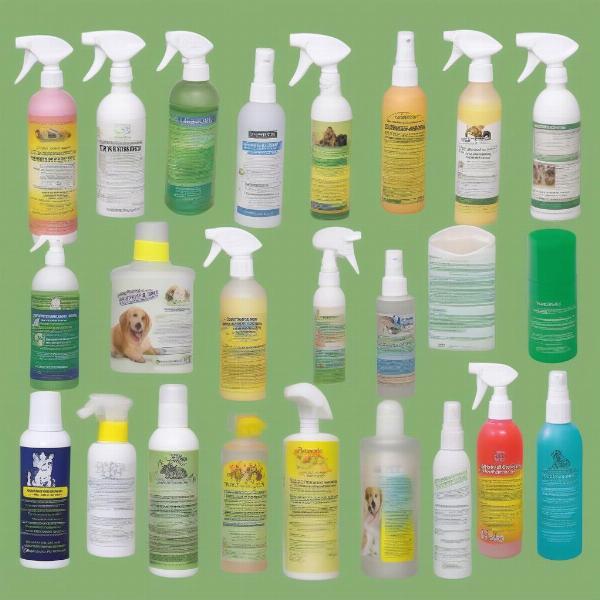Protecting your furry friend from pesky insects is a top priority for any responsible dog owner. Finding the right dog insect spray can be daunting with so many options available. This guide will explore everything you need to know about choosing and using dog insect sprays, from understanding the different types to ensuring your dog’s safety and well-being. We’ll cover natural remedies, chemical solutions, and everything in between to help you make the best choice for your canine companion.
Understanding the Need for Dog Insect Spray
Why is insect spray so important for dogs? Beyond the annoyance of buzzing flies and itchy bites, insects can carry diseases harmful to your dog. Mosquitoes can transmit heartworm, while ticks can spread Lyme disease and other serious illnesses. Fleas, apart from causing intense itching, can also lead to skin infections and tapeworms. A good insect spray acts as a protective barrier, preventing these parasites from latching onto your dog and causing harm.
Types of Dog Insect Sprays
There are various types of dog insect sprays available, each with its own pros and cons:
- Natural Sprays: These sprays often use essential oils like citronella, lemongrass, and eucalyptus to repel insects. They are a good option for owners seeking a chemical-free solution, but their effectiveness can vary.
- Chemical Sprays: These sprays typically contain pyrethrins or permethrins, which are synthetic insecticides. They are generally more effective than natural sprays but should be used with caution, following the instructions carefully.
- Combination Sprays: Some sprays combine natural repellents with synthetic insecticides for broader protection. These offer a balance between effectiveness and minimizing chemical exposure.
 Different types of dog insect sprays
Different types of dog insect sprays
Choosing the Right Spray for Your Dog
Selecting the right spray depends on several factors, including your dog’s age, size, breed, and lifestyle. For puppies and smaller dogs, always opt for sprays specifically formulated for them. If your dog spends a lot of time outdoors, particularly in wooded or grassy areas, a stronger, longer-lasting spray might be necessary. flea medicine for dogs provides further insights into flea and tick prevention.
How to Safely Apply Dog Insect Spray
Always follow the manufacturer’s instructions carefully. Avoid spraying near your dog’s face, eyes, and mouth. Apply the spray evenly over your dog’s fur, avoiding over-saturation. Wash your hands thoroughly after application. If you’re unsure about which spray to use, consult your veterinarian. They can recommend the best option based on your dog’s individual needs.
Natural Insect Repellent Alternatives
For those seeking natural alternatives to commercial sprays, consider these options:
- Apple Cider Vinegar: Diluted apple cider vinegar can be sprayed on your dog’s fur to deter fleas and ticks.
- Diatomaceous Earth: Food-grade diatomaceous earth can be sprinkled in your dog’s bedding to kill fleas and other insects.
- Neem Oil: Neem oil, derived from the neem tree, has natural insecticidal properties and can be diluted and applied to your dog’s coat.
Remember to always test any new product on a small area of your dog’s skin first to check for any adverse reactions. You can find more information about safe pest control on our dog friendly ant killer page.
Conclusion
Protecting your dog from insects is crucial for their health and happiness. Choosing the right dog insect spray involves understanding the different types available, considering your dog’s individual needs, and following safety guidelines. Whether you opt for a natural remedy, a chemical solution, or a combination of both, regular application of insect repellent will keep your furry friend safe from pesky parasites and the diseases they carry. For those in the UK, our article on what is the best dog flea treatment uk offers tailored advice. Don’t forget to check out our guide on dog flea treatments uk and flea collar dog for more information.
FAQ
- How often should I apply dog insect spray? Follow the manufacturer’s instructions, but generally, reapplication every few weeks or after swimming or bathing is recommended.
- Can I use human insect repellent on my dog? No, human insect repellents often contain DEET, which is toxic to dogs. Always use a product specifically formulated for canines.
- What should I do if my dog ingests insect spray? Contact your veterinarian immediately.
- Are natural insect sprays as effective as chemical sprays? Natural sprays can be effective, but their potency and duration of protection can vary.
- Can I use insect spray on puppies? Yes, but use a spray specifically formulated for puppies and follow the instructions carefully.
- What are the signs of an allergic reaction to insect spray? Signs can include redness, itching, swelling, and difficulty breathing.
- Where can I buy dog insect spray? Dog insect spray is available at pet stores, veterinary clinics, and online retailers.
ILM Dog is a leading international online resource for dog owners, dedicated to providing expert advice and guidance on all aspects of dog care, including breed selection, health, training, nutrition, grooming, and much more. We strive to empower dog owners with the knowledge and resources they need to raise happy, healthy, and well-adjusted canine companions. Whether you are a seasoned dog owner or just starting your journey, ILM Dog is your trusted source for reliable information and practical tips. For any inquiries, please contact us at [email protected] or call us at +44 20-3965-8624. Visit us at ILM Dog for more information.